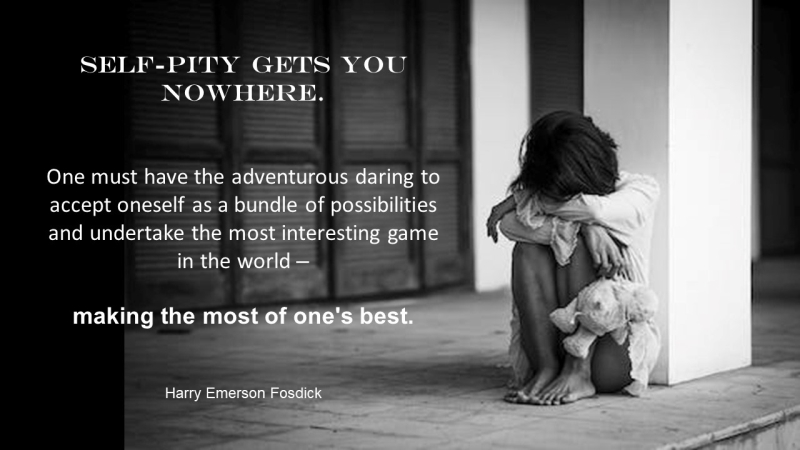ARE YOU STUCK IN A RUT, CONSTANTLY LAMENTING YOUR PROBLEMS AND FEELING SORRY? If so, you may be experiencing self-pity. Self-pity can be a challenging emotion to deal with. Still, it’s essential to acknowledge its adverse effects and take steps to rise above them. This article will explore the power of daring to be adventurous and how it can help you overcome self-pity. But first, let’s define self-pity and why it’s essential to rise above it.
Defining Self-Pity: Understanding the Emotion
Self-pity is a natural human emotion that arises when we feel sorry for ourselves or believe we are victims of our circumstances. It can result from several occasions, including a breakup, a job loss, or a health problem. While it’s normal to feel sad or upset during difficult times, self-pity goes beyond that and can become a destructive force in our lives.
The Adverse Effects of Self-pity
Self-pity can lead to various negative consequences impacting our mental and emotional well-being. Some of these consequences include:
- Low self-esteem
- Depression and anxiety
- Negative thought patterns
- Difficulty in forming relationships
- Lack of motivation and energy
It’s essential to recognize self-pity’s impact on our lives and take steps to rise above it.
The Importance of Rising Above Self-Pity
Rising above self-pity is crucial for our personal growth and happiness. When we are stuck in a cycle of self-pity, we limit ourselves and our potential. By daring to be adventurous, we can break free from these limitations and open ourselves up to new possibilities. Although it takes courage to venture outside our comfort zones and try new things, the results could be transformative.
In the following sections, we will explore how adventure can help you rise above self-pity and provide practical tips for overcoming this challenging emotion. So let’slet’s dare to be adventurous and rise above self-pity to take the first step toward a more fulfilling life.
Self-Pity and Its Consequences
Self-pity can be challenging to overcome, and it’s essential to understand how it can hold you back from living your best life. In this section, we will explore the consequences of self-pity and provide examples of how it can manifest in daily life.
How Self-Pity Can Hold You Back
Self-pity can hold you back in a variety of ways, such as:
- Limiting your potential: When you dwell on your issues and feel sorry for yourself all the time, it becomes harder for you to see opportunities and possibilities that might otherwise be there.
- Affecting your relationships: Because it can result in negative thought patterns and behaviors, self-pity can make it difficult to establish lasting relationships with others.
- Impacting your mental and emotional health: Feelings of depression, anxiety, and low self-esteem can result from self-pity, and these emotions can harm your general well-being.
Examples of Self-Pity in Daily Life
Self-pity can manifest in a variety of ways in daily life, such as:
- Making excuses: When faced with a challenge, you may make excuses instead of taking action to overcome it.
- Dwelling on the past: You may constantly dwell on past mistakes or negative experiences instead of focusing on the present and future.
- Playing the victim: You may view yourself as a victim of your circumstances and believe you have no control over your life.
The Cycle of Self-Pity and Its Consequences
Self-pity can create a destructive cycle that can be difficult to break. When you feel sorry for yourself, you may engage in negative thoughts and behaviors reinforcing your self-pity. This may have additional unfavorable effects, including:
- A lack of motivation and energy
- Difficulty in making decisions
- Increased stress and anxiety
It’s crucial to recognize this cycle and take steps to break free from it. In the following sections, we will explore how adventure can help you rise above self-pity and provide practical tips for overcoming this challenging emotion.
Dare to Be Adventurous
Daring to be adventurous can be a powerful way to rise above self-pity and unlock your true potential. In this section, we will explore the definition of adventure, how it can help you grow above self-pity, and provide examples of adventurous activities to try.
Definition of Adventure
Adventure can be defined as an exciting or unusual experience that involves taking risks and exploring the unknown. This can include trying new things, stepping outside your comfort zone, and embracing uncertainty.
How Adventure Can Help You Rise Above Self-Pity
Adventure can be a powerful tool for overcoming self-pity because it helps you to:
- Build confidence: Trying new things and taking risks can help you to build confidence in yourself and your abilities.
- Embrace uncertainty: Adventure requires you to embrace uncertainty and let go of the need for control, which can help you to overcome feelings of self-pity.
- Gain new perspectives: You can develop fresh perspectives and new ways of looking at things through adventure, freeing you from negative thought patterns and actions.
Examples of Adventurous Activities
There are many different adventurous activities that you can try, such as:
- Traveling to a new destination: Exploring a new place can be a great way to step outside your comfort zone and gain new perspectives.
- Trying a new hobby or sport: Trying a new hobby or sport can help you to build confidence and discover new passions.
- Challenging yourself physically: Participating in physical challenges such as rock climbing, hiking, or obstacle courses can help you to overcome self-doubt and build resilience.
It’sIt’s essential to remember that adventure looks different for everyone, and what may be adventurous for one person may not be for another. The key is finding activities that challenge you and help you grow outside your comfort zone.
Overcoming Self-Pity: Tips and Strategies
Overcoming self-pity can be a challenging but rewarding journey. The advice and techniques discussed in this section will assist you in overcoming self-pity and embracing a more exciting and fulfilling life.
Acknowledge and accept your feelings.
The first step in overcoming self-pity is to acknowledge and accept your feelings. It’s okay to feel sad, frustrated, or disappointed sometimes, but avoiding getting stuck in a negative mindset is essential. By acknowledging your feelings and accepting them without judgment, you can move past them and focus on positive change.
Cultivate a growth mindset.
Another helpful strategy for overcoming self-pity is to cultivate a growth mindset. This involves embracing challenges as opportunities for growth and learning rather than viewing them as threats. By approaching life with a growth mindset, you can become more resilient, adaptable, and open to new experiences.
Practice gratitude
Gratitude is another powerful tool for overcoming self-pity. You can refocus your attention and develop a more optimistic outlook by considering what you have to be grateful for. Try making a list of things you are thankful for each day or taking time to reflect on the blessings in your life.
Challenge negative thoughts and beliefs.
Finally, it’s important to challenge negative thoughts and beliefs that may be holding you back. Negative self-talk or constricting beliefs about yourself or the world around you frequently serve as fuel for self-pity. By actively challenging these thoughts and ideas and replacing them with more positive and empowering ones, you can break free from the cycle of self-pity and embrace a more adventurous and fulfilling life.
It takes courage, self-awareness, and a willingness to take chances and try new things to rise above self-pity. You can break free from self-pity and unlock your full potential by acknowledging your feelings, cultivating a growth mindset, practicing gratitude, and challenging negative thoughts and beliefs. Remember, the most exciting game in the world is making the most of your best, so dare to be adventurous and see where life takes you!
Embracing the Adventure of Self-Discovery
Self-pity can make us feel stuck, unable to move forward, and limited in our possibilities. However, self-discovery is one way to break free from self-pity and embrace a life of adventure. By exploring and discovering more about ourselves, we can find new ways to grow, learn, and overcome obstacles. Here are some ways to embrace the adventure of self-discovery:
How Self-Discovery Can Lead to Personal Growth
Self-discovery involves uncovering your true self, passions, values, strengths, and weaknesses. Through this process, you can learn more about who you are, what you want, and how to live a fulfilling life. Self-discovery can help you:
- Develop greater self-awareness and self-confidence.
- Find your purpose and direction in life.
- Enhance your relationships with others.
- Build resilience and cope with challenges.
- Cultivate a more positive mindset.
The Benefits of Trying New Things
One way to embark on a journey of self-discovery is to try new things. When we step outside our comfort zone and do something we have never done, we open ourselves to new experiences, perspectives, and opportunities. Here are some benefits of trying new things:
- Boost creativity and innovation.
- Build confidence and self-esteem.
- Expand knowledge and skills.
- Foster a sense of curiosity and wonder.
- Build resilience and adaptability.
The Role of Self-Acceptance in the Adventure of Self-Discovery
Self-discovery requires self-acceptance. It means embracing all parts of ourselves, even those we may not like or feel ashamed of. Self-acceptance is not about being complacent or settling for less; it is about acknowledging our strengths and weaknesses and working towards self-improvement. Here are some tips for cultivating self-acceptance:
- Practice self-compassion and kindness.
- Focus on your progress, not perfection.
- Embrace your imperfections and vulnerabilities.
- Recognize that mistakes and failures are growth opportunities.
- Surround yourself with positive and supportive people.
Self-discovery is a powerful tool for overcoming self-pity and embracing a life of adventure. By trying new things, cultivating self-acceptance, and pursuing personal growth, you can unlock your full potential and make the most of your life. So go ahead, dare to be adventurous, and embark on the exciting journey of self-discovery.
Conclusion
The negative and counterproductive emotion of self-pity can prevent someone from realizing their full potential. Instead, people should embrace their unique qualities and talents and approach life with a sense of adventure and exploration. By doing so, they can unlock their true potential and make the most of their strengths and abilities, leading to a fulfilling and meaningful life.
Self-pity is a common human emotion but can hinder personal growth and happiness. We can rise above self-pity and discover our full potential by daring to be adventurous.
We have explored the harmful effects of self-pity, the benefits of adventure, and strategies to overcome self-pity. Remember to acknowledge and accept your feelings, cultivate a growth mindset, practice gratitude, and challenge negative thoughts and beliefs.
Embracing the adventure of self-discovery can lead to personal growth, and trying new things can bring numerous benefits. Self-acceptance is an essential part of the adventure of self-discovery and can help you overcome self-pity.
So, let us all be daring and adventurous, embrace new experiences, and overcome self-pity. Let us make the most of our potential and the most exciting game in the world—making the most of our best!
CLICK THE IMAGE TO LEARN MORE




